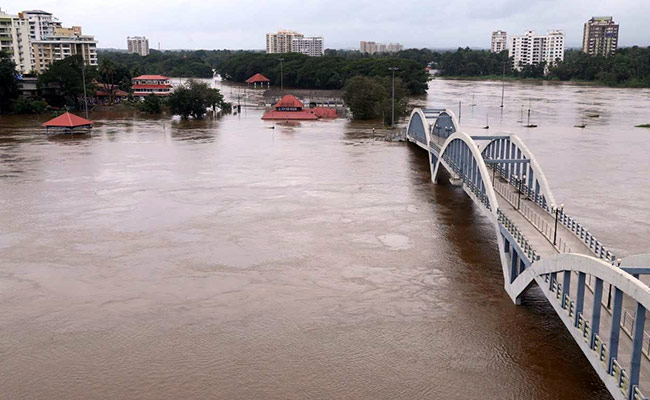The Water Next Time — And This
Kerala Floods Signal That Climate Change Is Here. Now.
 With the daily freak show of American politics, you might be forgiven for not noticing one of the most horrific disasters in years: the devastating floods in the southwestern Indian state of Kerala, at the tip of the subcontinent. More than 500 people have died, thousands of homes have been inundated, and more than 1.5 million people have been displaced.
With the daily freak show of American politics, you might be forgiven for not noticing one of the most horrific disasters in years: the devastating floods in the southwestern Indian state of Kerala, at the tip of the subcontinent. More than 500 people have died, thousands of homes have been inundated, and more than 1.5 million people have been displaced.
Kerala has not had a flood like this in a century, but it is the nature of the flooding that signals its origins in climate change. Usually, the Indian monsoon occurs in June and July: here, they continued through August, but with a twist: there were fewer total rainy days, but those days that did get rain were significantly and severely wetter. On August 15th – India’s Independence Day — the state got 13 centimeters, about 13 times normal. This pattern is precisely what the IPCC predicted in its 2007 report.
Perhaps the greatest tragedy of the situation is that Kerala has long been a model in India of, if not good governance, then at least better governance than anywhere else. With a strong history of working-class social mobilization, it has achieved many development indicators far ahead of the rest of the Union and Asia — areas like life expectancy, maternal mortality, poverty, electricity penetration, literacy, etc. It will need all of its social resources to claw its way back.
But then the next flood will come: the IPCC report predicted 100-year floods every four-to-five years. Unlike many of the biggest emitters, India also is particularly vulnerable to climate effects. Any new development model will need to include a significant amount of climate adaptation. Currently, Kerala lacks any integrated climate adaptation strategy. It needs one, soon.
Reader Comments
One Reply to “The Water Next Time — And This”
Comments are closed.






The out of control tragedy is that “the daily freak show of American politics” has been a fact of life for decades and we can now expect that we shall exceed the “point of no return” for global warming and fail to pass on a legacy of an acceptable quality of life.
In his August 30 “Climate Ed. — What are Kids Learning?” post Dan Farber recommended: ““We should also try to do better in getting our findings before the public and especially before young people, through traditional and digital media.”
It’s time to make the right things happen with the greatest sense of urgency because 2018 has taught us that we have already run out of time.